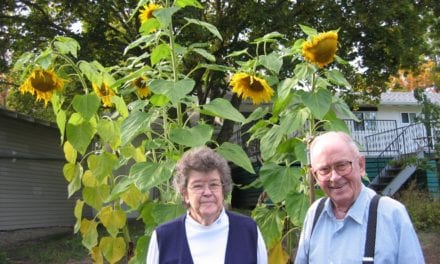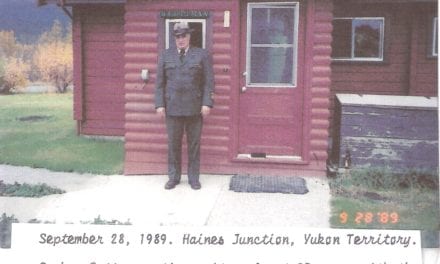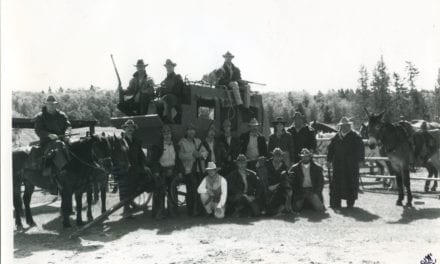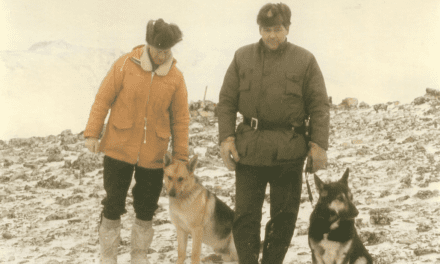This Oral History interview was funded in part by a research grant received in 2021 from the Government of Alberta through the Alberta Historical Resources Foundation.
Park Warden Service Alumni Society of Alberta
Oral History Project Phase 11 – Spring 2021
Telephone Interview with Doug Burles and Faye Burles
April 13, 2021 – 11:00 am
Interviewed by Susan Hairsine
All photos supplied by Doug and Faye Burles.
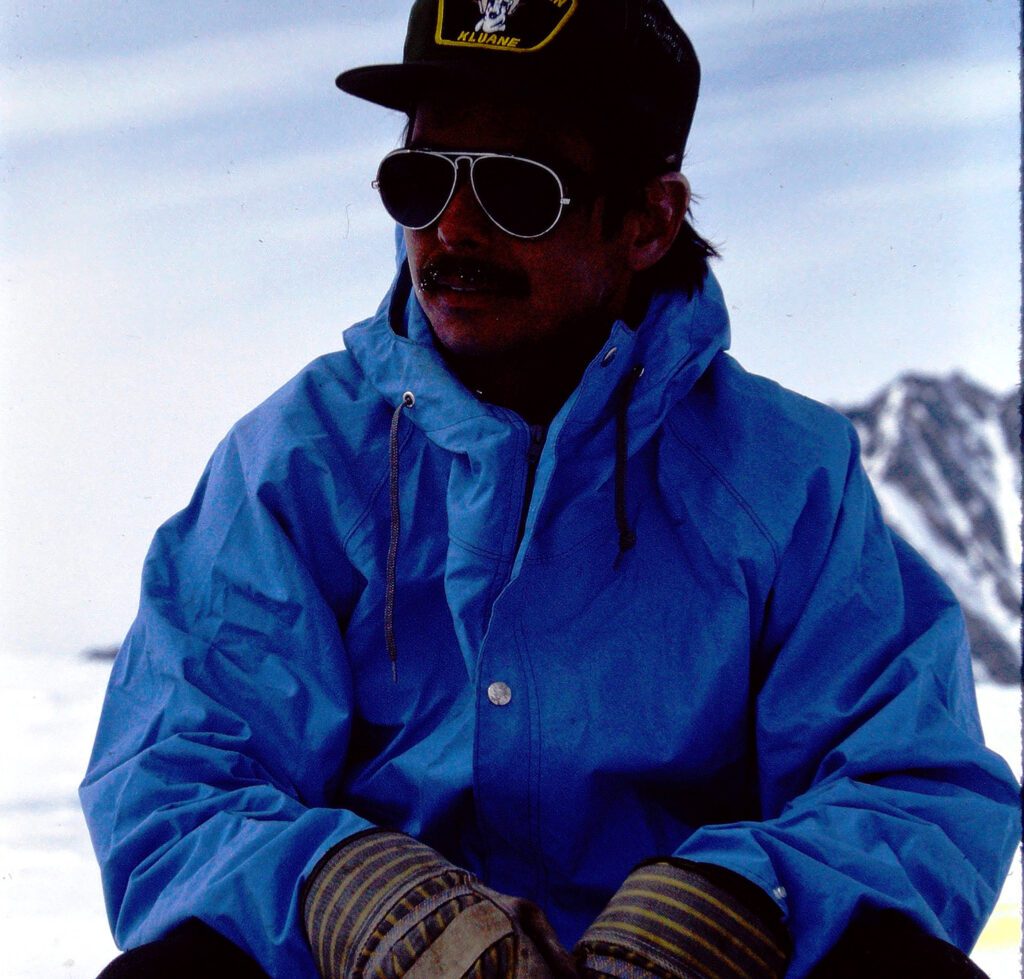
Doug Burles travelling in the Ice Fields, Kluane National Park.
Place and date of birth?
Doug was born in Banff on March 12, 1952. Doug’s mom was born in Banff and his family and relatives go back to the beginning of Banff. He had relatives there in the 1880s and 1890s.
SH: Where did you grow up?
Doug: I grew up in Banff. I must have been about 19 or 20 when I went to Kootenay and then later on I started moving around more, but before that I was just basically growing up in Banff.
SH: Wow, you are a lucky soul. How did you become involved in the Warden Service? Which national park did you start working in?
Doug: To start with, as I said I lived in Banff, so I knew Banff and the wardens. But my dad was the Barn Boss to the wardens in Banff. As a young kid I used to travel with him all the time. He would go and shoe the horses out on the stations, so I grew up knowing some of the old-time wardens and even played with their kids on some occasions. Early on I realized that they led a great life and that seemed very interesting to me. That would be a great job that would get me outside and working with wildlife which is what I think I always wanted to do.
SH: What national park did you start working in then …. Kootenay?
Doug: Actually I started in Banff around 1971 I think it was. They had a program to hire young people to work so I was hired on through that program. It was interesting. I started off laying a water line and on the second day I came to work after lunch, and there was a warden there. He said, “You just got transferred to the wardens. We need somebody who can handle horses, and work with horses, and we know you can. So we want you helping us”. So, I went to work for them that summer, and as I said, I got the job because I knew a little bit about horses.
In the early years that was an important part of the job, looking after horses. I may have been one of the later ones that was hired for that reason but it worked out for me.
So after Banff I went to Kootenay Park as a seasonal warden and then from there I got a job in Nahanni National Park, and while I was working in Nahanni I did get a chance to work in Wood Buffalo Park for a little bit while I was up there. From there I worked in Prince Albert National Park for a number of years and then from there I was transferred to Kluane National Park and I was there for quite a number of years. Eventually I moved from there to Riding Mountain National Park for a few years and then from Riding Mountain I moved back to Prince Albert and worked there again as an Assistant Chief Warden. I worked there for a number of years and I finally moved to Gwaii Haanas National Park as a new warden there right after it was established. That’s where I ended my career, in Gwaii Haanas.
SH: Wow, I had no idea you’d worked in that many places Doug. That’s really great.
Doug: Yes, each one was so very interesting. It was a great way to see our Parks system.
SH: I think of all the people I’ve interviewed you have worked in the most national parks.
Doug: I always thought people should move around and see these other parks and experience them. But there was a whole group there that were happy to be working where they were, and never moved and they missed a lot of opportunities. (Tape 06:35)
SH: What made you want to join the Warden Service?
I think I mentioned why I wanted to and during those early years I did go to university and studied biology. So, to work with the park wardens just tied in with the education that I was taking, and it led to a great many opportunities.
SH: Where did you go to school Doug?
Doug: I went to University of Calgary and got a degree in biology. I started in 1971 or 1972 so I must have graduated in 1975. I was with some of the early individuals. Like I was saying early on they were hiring wardens who could handle horses but starting in about the 1970s they started hiring wardens with education. The whole job of wardens was changing, and they felt there was a requirement for people with better education so I was sort of on the early track of doing that idea.
SH: So you were a seasonal warden at times, in Kootenay and Banff and then you got your schooling and then you were hired on full time in Nahanni?
Doug: Yes that’s right. Nahanni was a full time job.
SH: So we talked about the different parks you worked in, but how did they compare, and do you have a favorite?
Doug: That’s a difficult question because every park has some beautiful things and really great ideas for being there and working there. I think going to Nahanni was really great because I was young and looking for adventure. It certainly was an adventure to go to a new park and such a remote park. It is an absolutely beautiful place.
The one I enjoyed perhaps the most was going to Gwaii Haanas at the end. But that’s maybe the one I remember best because that’s the last one I worked in. They all have some very interesting things that I remember of each one.
SH: What were some of your main responsibilities over the years? You were on the coast and in the mountains and on the prairies.
Doug: Well over the years, those were the days in the early years when a warden was responsible for a lot of things. So I did get involved in a lot of different things. I think a number of the parks, actually I think all of them, I got completely involved in the wildlife studies and management of wildlife in the early years, whenever I could. At the end of my years in Gwaii Haanas that was primarily my job. I was studying bats and other animals.
While I was in Kluane I was part of the search and rescue team there. There were others there doing their thing, but I was the back up. Law enforcement in Riding Mountain and Prince Albert was a big issue and I got involved in that very much. Certainly the search and rescue, I was involved in all the parks. In Nahanni and Gwaii Haanas I had a little bit to do with the planning of what we were going to do when we were there and how we were going to manage it.
SH: I remember you would come to the Public Safety regional committee meetings from Gwaii Haanas as the coastal representative.
Doug: Yes that’s right.
Faye Burles: I just want to mention that Doug was also expected to be part of the Volunteer Fire Department and the ambulance, the voluntary ambulance crew in quite a few places that we lived, so he was doing that on the side as part of the job too.
SH: So you had lots of first aid I’m guessing too.
Doug: Yes, usually we were the people around that had the good training in public safety, so we were called upon to help out, especially in these more remote places where there wasn’t a lot of people who could do that job, so we filled in a few times for the community and for parks.
SH: Did you guys live at stations at all in the various parks? (Tape 13:15)
Doug: I guess in Kluane we were in what you would call a station at the north end, at Destruction Bay.
SH: Wow. And the other parks you lived in the townsite?
Doug: Yes most of the other places we lived in, they were centralized, and we worked from the centers of towns and worked from there.
SH: What did you like about being a warden? What didn’t you like about being a Warden?
Doug: As I mentioned already, I wanted to work with wildlife and study wildlife right from when I was very young. Being a warden, I got many, many opportunities to work with fish, study eagles, wolves, a whole variety of wildlife. Surveying wildlife …. all kinds. I think one of the ones that really reminds me of Gwaii Haanas, was going on the peregrine falcon surveys. We did them by boat, and we boated entirely down the west coast of the island. It was a great opportunity.
SH: Wow, would you see lots of whales and things as well at Gwaii Haanas?
Doug: Yes, and we were doing monitoring of the whales also, because some could be identified. You would take photographs of either the tail or the dorsal fin. So, we were involved in collecting information on whales that were present and things like that.
SH: What are some of the more memorable events of your Warden Service career?
Doug: Every park I could probably come up with a story, but I guess the one I remember right from the very beginning…I was in Banff and I think I was 18 years old working there. They had sent me out to Egypt Lake to work there as a warden. This was in late August and it was starting to get cool at night. My boss calls me on the radio about 9:30 in the morning and said, “We want you to move to Bryant Creek cabin because we want to come up and use Egypt cabin”.
So that’s a very long ride and if he had given me warning I would have been up early. Fortunately I had the horses nearby, so I packed up but it was close to 11 a.m. before I started down the trail to ride there. It’s a long, long ways. I got up to Sunshine Meadows and it started to rain and then hail on me. Finally, it snowed and all across the meadow I got totally snowed on. It was just a terrible, miserable trip. It was a very slow trip because my pack horse was hurt a little bit, when I had come in, with cinch rubbing. He was very slow, and it was a very slow trip. Finally, I rode into Assiniboine Lodge and it was two hours after dark. It was very late and by then I was exhausted. Fortunately Irling Storm came out and said “Where the heck are you going?”.
I said “I’m on my way to Bryant Creek Warden Cabin”.
He said “No, you are staying here tonight.”
So, it was absolutely great. He put me up for the night and they even fed me that evening and took care of my horses. He took me into the kitchen and the cook, she sat me down on the chair and said, “I’ll pull your boots off.” So she grabbed hold of my boots and of course they were sopping wet and had shrunk over my feet. They were really on tight, and she just jerked me and pulled me right off the chair onto the floor so after that we decided that maybe I better take me own boot off. But she fed me a wonderful meal.
I rode on to the cabin the next morning and realized there was a search on for me because I wasn’t at the cabin and hadn’t called on the radio that I was at Assiniboine. Everything was fine as later on that day they did find me at the cabin. A little bit of excitement and embarrassment for sending me on such a long hard trip.
SH: Yes that’s a very long trip and still a couple of hours ride from Assiniboine to Bryant Creek cabin.
Doug: Yes it’s a heck of a long ways. That’s one I remembered my whole career because it was a real test on me, but I made it.
SH: Can you tell me about any rescue/wildlife/enforcement stories that stick out in your memory? (Tape 21:46)
